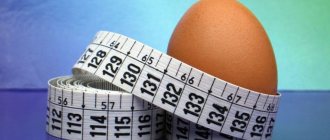Why weight doesn't come off on the Dukan diet
The reasons why weight does not come off on the Dukan diet may be the following.
Some types of vegetables retain fluid in the body, which contributes to weight gain. 500 g of excess water in the body - plus 500 g on the scales. Reconsider your vegetable intake. It is better to eat all types of cabbage (broccoli, cauliflower, cabbage), raw beets, carrots, zucchini and zucchini.
Excessive salt intake also contributes to water retention in the body.
During the premenstrual period, the body retains water due to the release of the hormone estrogen, so you can gain up to three kilograms. During menstruation, the hormone estrogen is no longer released and excess water is eliminated from the body. During menstruation, it is recommended to reduce salt intake so that water does not retain in the body.
You are not drinking enough water. On the Dukan diet, it is important to follow not only the diet, but also the water consumption regimen. The norm is 1.5-2 liters of pure still water per day. Water is important for proper metabolism in the body and can reduce appetite. Lack of water in the body affects the metabolic rate, slowing it down and affecting liver function. If it is difficult to drink still water, you can drink green or herbal teas, herbal teas, less often black tea, sometimes cola light (which does not contain sugar) or carbonated mineral water. It is worth considering that some types of mineral water contain salt, which retains water in the body.
You eat too little. You can't fast on the Dukan diet. You need to consume 1.5 g of pure protein per 1 kg of weight per day.
You don't eat bran or you don't eat enough of it. You need to add 15 g of oat or wheat bran (3 tablespoons) to your food per day. Bran promotes proper digestion, prevents constipation and removes toxins from the body. Bran is fiber that is not absorbed by the body.
You are not active enough. It is worth remembering that you should definitely walk 20-30 minutes a day at any stage of the diet. If you have gained weight, you should increase your walking time to an hour a day - this will increase the burning of calories.
Seven reasons for weight stagnation
The occurrence of a period when kilograms should decrease, but this does not happen, is associated both with a violation of the principles of the weight loss program and with a state of health. Individual hormonal levels, medical contraindications, and susceptibility to metabolic diseases also affect the rate of weight loss.
Popular reasons for weight gain on the Dukan diet include the following:
- Lack of water consumed
- Excess salt intake
- A typical female factor is the premenstrual cycle,
- Large volumes of allowed foods eaten,
- Malnutrition,
- Small proportion of physical activity
- Relapse, consumption of products prohibited by Dukan.
The causes, their consequences and measures to prevent weight stagnation are discussed in more detail in the table.
| Cause | Consequence | Measures and actions |
| Lack of water | Without enough fluid, appetite suppression is more difficult, and the involvement of fat deposits in metabolic processes slows down. | Mark the amount of water you drink per day in your food diary. If it is less than 2 liters, be sure to increase it. |
| Excess salt | Salt is a fluid blocker in cells; due to water accumulations, weight can not only remain, but also increase. | Reduce the amount of salt to a minimum or completely avoid it. |
| Menstrual period | 65% of women losing weight on the Dukan diet complain of weight stagnation during these days. The culprit is the hormone estrogen, which helps retain fluid in the body. | Leave the problem until the end of the critical days. Most likely, the weight will begin to decrease as soon as the body returns to normal. |
| Binge eating | Abuse leads to weight gain | Reduce food portions |
| Malnutrition | Leads to metabolic imbalance. Check the amount of foods you eat with Pierre Dukan’s standards and adhere to them. Insufficient activity According to Dukan, a person losing weight using his method only needs to walk 20 minutes a day. But this is an average calculation and does not apply to everyone. | Increase physical activity by swimming, running, aerobics, etc. |
| Disruption | Loss of incentive to lose weight | Working on your psychological attitude. Experiences “why am I not losing weight on the Dukan diet?” replace with mental images of yourself in an elegant and slender image. |
Lack of water
Excess salt
Menstrual period
Binge eating
Malnutrition
Disruption
Why am I not losing weight during the Attack phase of the Dukan Diet?
Many people who are losing weight are faced with the fact that they lose weight already in the first phase of the Attack diet. The reasons why the weight does not come off on Attack may be different.
You are following your diet incorrectly. Perhaps the information on the Internet about the Dukan diet is not complete and accurate enough. It is very important to calculate your true weight to calculate your diet plan. This can be done for free on the official Dukan website. It is also advisable to still purchase Dukan's book, because... there are many nuances that are not found on the Internet. And generally, those who follow the diet according to the book have better results.
You are consuming too much salt. Try to reduce the amount of salt you eat; study the ingredients of products when purchasing in the store.
You are not drinking enough water. You need to drink at least two liters of water per day.
Diet resistance. If you've tried many diets, your body may be resistant to dieting and find it harder to shed those extra pounds.
Don't neglect bran. This is fiber that is not absorbed by the body, but removes toxins and promotes good digestion. You need 15 g of oat or wheat bran per day (3 tablespoons).
Health problems:
- One of the most common reasons that prevent weight loss is problems with the thyroid gland.
- Constipation. One solution to this problem could be mineral water with a high magnesium content, drunk on an empty stomach.
- During menopause, women retain water in their bodies, their metabolism slows down, and hormonal disruption may occur, which leads to weight loss.
- Use of medications. Some antipsychotics, antidepressants and anti-inflammatory drugs affect weight loss.
Not enough water
There are several reasons why weight does not come off on the Dukan diet. Weight with such a nutrition system directly depends on the amount of water drunk per day. The diet proposed by the doctor suggests that a person adhering to the principles of the diet should drink at least 2 liters of clean water per day. This is very important, because the liquid not only suppresses appetite, but also helps break down fat deposits. Lack of water leads to a slowdown in metabolism. The body is forced to devote all its efforts not to breaking down excess fat, but to restoring fluid reserves.
If it is difficult for you to drink large quantities of clean, cold water, you can replace it with green tea, herbal infusions, and dried fruit compote without added sugar. Interestingly, those losing weight on the Dukan diet can even drink Coca-Cola Light. However, due to the sweetener aspartame it contains, it is still not worth abusing it.
What to do if your weight stays the same
As a rule, a positive result from losing weight becomes a good motivation for a long-term diet. But if you are not losing weight and your weight has stagnated during the Dukan Diet, try one of the following methods:
- Have three fasting days on protein foods, but give up dairy products. Thanks to such unloading, ketosis will begin to work more actively, and weight will begin to decrease.
- One of the most effective methods is fasting days on green tea. You need to drink hot or cold green tea for three days; you can drink it at any time of the day, but without sugar or sweetener. You can only drink green tea. Green tea has antioxidant properties that will start the body's metabolism.
And here is a video about the Plateau effect on diets:
Remember, the one who walks will master the road. Don't give up, and you will definitely achieve your intended result.
Little sport
What else will help you lose weight? On the Dukan diet, weight is also due to the fact that those losing weight do not lead an active enough lifestyle. The rules recommend spending at least 20–30 minutes a day walking. If you notice that the weight has stalled and does not want to budge, increase the load to 1 hour. Are you sure that you have absolutely no time for sports? In fact, doing this is not as difficult as it might seem. You don't even have to sweat for hours in the gym. It’s enough just to get off not 1, but 3 stops earlier. You will come home half an hour later, but the goal will be achieved.
General tips for dealing with periods of stagnation:
- If there is water retention in the body, use diuretics.
- Do not eat salt, or reduce its amount to a minimum. Replace salt with spices.
- Increase your physical activity.
- Do not eat inappropriate foods.
- Take cold showers more often. Don't forget to suck on the ice!
- Avoid eating vacuum-packed foods.
Bookmarks
Those who read this article were also interested in:
- Results of losing weight at the Attack stage For everyone who is just starting to follow one or another...
- Maggi Diet (Egg Diet) Maggi Diet (Egg Diet) is a current…
- Autumn Diet In the fall, many people experience depression, which is why they begin...
Heading:
- All about the Dukan diet
Dukan diet: what you need to know
HISTORY OF THE ISSUE
Protein-based diets have been trending for over 50 years. They are based on the idea that if you limit carbohydrates in the menu, the body will receive energy from fat, or rather, from ketone bodies formed during the breakdown of fats. A condition in which the level of ketone bodies in the blood increases is called ketosis. It has long been known that ketosis significantly reduces the number of seizures in patients with epilepsy.
But Dr. Robert Atkins, the author of the well-known Atkins ketogenic diet, was one of the first to bring people into ketosis so that they lose weight. His patients actually lost weight, at least at first. But the medical community received the idea ambiguously. Questions immediately arose: how will an almost unlimited intake of fat and a fairly high intake of protein affect the body? How safe is the diet for health and will you be able to maintain the results?
The studies gave conflicting results, and one after another, new protein diets began to appear - Zonal, Paleo, Dukan, etc. They took into account the comments of experts and tried to somehow balance the diet - they prescribed the mandatory consumption of fiber, water, fermented milk products, etc. d. Even the latest version of the Atkins diet (which appeared after his death) no longer involves unlimited fat consumption.
Such diets reached their peak in popularity in the late 90s – early 2000s. According to statistics, 18% of Americans have practiced them while trying to lose weight. There is no such data for Russia, but judging by the fact that the central media wrote about the Kremlin diet (a modification of the Atkins diet), we also had a lot of Atkins followers. Protein diets remain in demand today. They may vary in the allowable amount of fat (vegetable or animal), include (or not) mandatory fitness classes, but assume that a person receives 1.2-1.6 g of protein per kg of weight. At the same time, the WHO norm is 0.8 g of protein per kg of weight.
WHY DOES EVERYONE LIKE THEM SO MUCH?
The main feature of protein diets is that they are very simple. There is no hassle with calculations, calories, the main thing is to remember what is not allowed, and do not break these rules. This is especially appreciated by men who do not like unnecessary complications. Secondly, there is no feeling of hunger. Protein takes a long time to digest, from 4 to 8 hours, and gives a prolonged feeling of fullness. Yes, there may not be a feeling of complete satisfaction without a piece or two of bread, but you can live. At the same time, up to 30% of the calories it provides are spent on protein processing (and only 3% on fat processing). Thus, an increased dose of protein helps reduce the total caloric intake of the diet. Third, protein diets give quick and noticeable results, and this motivates you to continue.
WHAT'S BAD ABOUT THEM?
Despite the apparent logic, there are many unpleasant details in protein diets. Firstly, the body, limited in carbohydrates, obtains energy not only from fat depots, but also from its own muscles. This is bad, because as a result, muscle volume decreases and you get that classic “skinny fat”, when there seems to be no excess weight, but the body is devoid of elasticity and strength. In addition, muscles are the main consumers of calories, and when muscle mass decreases, metabolism slows down.
Secondly, on a protein diet, the body becomes dehydrated, and those same 3-5 kg that are easily lost literally in the first days are not fat, but water. As a result of dehydration, unexpected wrinkles may appear, fatigue increases, and mood deteriorates.
Third, in the long term (and usually people sit on protein diets for a long time), an unexpectedly large number of health problems appear.
Protein diets negatively affect the kidneys, which have to work harder to remove protein breakdown products. In addition, urine becomes “acidified,” which often leads to the formation of kidney stones and creates excellent conditions for the development of inflammatory processes.
According to statistics, 3 months after starting the diet, the risk of gallstones increases by 80%. And experiments on mice conducted by Brazilian scientists showed that a diet similar to the Atkins diet leads to negative changes in the liver after 8 weeks.
Another typical problem is intestinal dysfunction due to lack of fiber. Constipation begins, and it can end in hemorrhoids. Another detail that is not obvious to many is that in order to process large amounts of protein, the body requires calcium, which it takes from the depot - teeth and bones. So there are frequent cases of the development of osteoporosis on the background of protein diets, especially in women during menopause. There is also a risk for the joints - purine bases, which are a product of protein breakdown, can trigger the development of gout.
And for dessert - possible consequences for the cardiovascular system and increased risks of blood clots - due to increased blood clotting.
What tests should I take?
If you follow a protein diet, you need to get tested every 3 months to understand how this diet affects the body, whether it is possible to continue in the same spirit - or is it time to return to a balanced diet.
General blood analysis . You need to monitor your hemoglobin level - on a protein diet it is often too high. Increased hemoglobin is a thickening of the blood, which increases the load on the heart and lungs. The most serious possible complication is the formation of blood clots.
General urine analysis . Large amounts of protein in food lead to the formation of salt crystals in the urine, which can provoke inflammation of the kidneys and lead to the formation of stones. The appearance of ketones in the urine (acetone) indicates intoxication of the body with protein breakdown products.
Blood chemistry . A high-protein diet increases uric acid levels, which increases the risk of developing gout. In addition, you need to control the level of total cholesterol and low-density lipoproteins.
Abdominal ultrasound to monitor the condition of the kidneys, liver and gallbladder.
WHAT OPTIONS DO WE HAVE?
While scientists are finding out how harmful/beneficial a protein diet is, we can definitely say that children, teenagers, people over 50 and those with a low metabolic rate should not lose weight on it (you can find out how active your own metabolism is by using bioimpedansometry).
Take the test
Is your metabolism ok?
Protein diets can be effective if they are practiced by athletic men with an active metabolism, or very young girls for whom this is their first dietary experience. However, it is not yet known whether the result will be maintained. By the way, the same Dukan is no longer popular in Europe and is perceived as a clearly commercial project. But even he publicly acknowledged that, in general, protein diets are an option for completely healthy people. But how many of us are there like that? Therefore, if you do not want to take risks, use not the entire protein diet, but its elements.
Have protein fasting days . A variant from the “I need to take my dress out” series. They can be arranged once a week. This is either 300-400 g of protein products + 1 kg of vegetables, or a purely protein day - 600-800 g of lean meat of one type - beef, chicken, turkey. How to cook? Boil or stew. And don’t forget to drink your daily amount of water, this is very important.
Practice protein dinners . They can be made a daily part of the menu. 2-3 hours before bedtime, eat a portion of lean protein - chicken breast, cottage cheese, egg whites - with vegetables as a side dish. It is optimal to combine such dinners with a carbohydrate breakfast (porridge, sandwiches) and a mixed lunch (fish/seafood/lean meat + vegetables + 2-3 spoons of carbohydrate side dish). In total, there should be 4-5 meals per day: 3 main meals + 1-2 light snacks. This tactic will allow you not only to not gain weight, but also to lose weight. Just give yourself time, don’t rush things. It is physiological to lose no more than 500-800 g per week for women and 800-1000 g for men.
How to improve your protein diet
- Add nuts, vegetable oil and fish to your diet as polyunsaturated fatty acids that are good for the heart and blood vessels.
- Eating meat is boiled - during the cooking process, purines are partially digested from it. Drain the broth.
- Eat more unsweetened fruits - the substances they contain prevent the formation of salt crystals in the urine and, accordingly, the formation of kidney stones.
- Add fiber and low-fat fermented milk products to your diet to improve bowel function.
- Drink more water - at least 32 ml of liquid per 1 kg of weight (depending on individual characteristics, this volume can be increased).
- Eat more low-fat cottage cheese as a source of calcium.
Author: Sonya LIVSHITS Published: May 4, 2017
Four stages of the diet
The Dukan nutrition system includes several stages.
Stage one: “attack”
The goal of the first stage of the diet is to get rid of kilograms as quickly as possible. Rapid weight loss is achieved through a high-protein diet. Protein-rich foods have a complex structure; to digest them, the body expends more calories than it receives, thus burning previously stored reserves.
The duration of this stage takes a maximum of a week, depending on how many extra pounds you have. If the excess weight is up to 5 kg, the “attack” should last 1-2 days, if you need to lose 5-10 kg, then the “attack” will last up to 5 days, and if 10 or more kilograms, then the duration of the stage will be 5-7 days.
Stage two: “cruise”
The goal of the second stage of the diet is to achieve your optimal weight, which should not at all correspond to fashion trends. A person should be comfortable with his weight, he should not feel heaviness or difficulties during physical activity, and it is not at all necessary to achieve the ideal “90-60-90”. At this stage, it is permissible to diversify the diet of protein products with vegetables, with the exception of those that contain a high level of carbohydrates (potatoes, peas, etc.).
The duration of this stage corresponds to the following calculation: for every kilogram lost during the “attack” there should be a week of “cruise”. For example, if in the first stage of the Dukan diet you managed to get rid of 12 kilograms of excess weight, then the second stage will be 12 weeks.
Stage three: “consolidation”
The goal of the third stage of the diet is to consolidate the achieved results. It is necessary to gradually come to a balanced diet, with a greater variety of foods than was previously allowed. This stage represents the period of time when the body gets used to the new weight, but at the same time the dietary restriction is eliminated. It is acceptable to include fruits, bread, dairy products containing fat, cereals, and sweets in your diet.
The duration of this stage corresponds to the calculation: 10 days per 1 kilogram lost over the previous period. For example, if during the first and second stages of the Dukan diet you managed to lose 15 kilograms of excess weight, then the third stage will last 150 days, that is, a little less than 5 months.
Stage four, final: “stabilization”
The essence of “stabilization” in the Dukan diet is to allow yourself healthy, balanced foods, avoid restrictions as much as possible, but not gain excess weight. A good body shape will be maintained, according to Dukan, if a person continues to adhere to proper nutrition and an active lifestyle in the future.
At this stage, you can completely diversify your diet (within reason) by adhering to only three rules:
- once a week, organize an “attack” on the body, follow the menu of that stage;
- eat 3 tbsp daily. oat bran;
- give preference to active leisure, at least walking up the stairs when there is an opportunity to ride the elevator.
The “stabilization” stage lasts throughout life.










